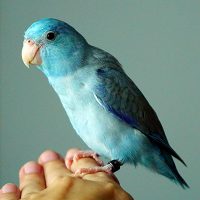Are you interested in adopting a bird? Polly is a very cute and lovable pet! However, caring for a bird is very different from caring for a dog or cat, so first-time bird owners may face a bit of a learning curve. An Ellicott City, MD vet lists some common bird care mistakes in this article.
Poor Nutrition
Many people assume that birds only need to eat seeds and pellets. However, that isn’t exactly the case. In the wild, birds also eat vegetation, such as berries, and have a much greater variety of seeds. While seeds and pellets are an important part of Polly’s menu, you’ll want to supplement that with other foods, such as safe fruits and veggies. Ask your vet for specific advice.
Improper/Lack Of Perches
Did you know that birds use perches for socializing, grooming, sleeping, eating, and watching their humans? A single perch really isn’t enough for your feathered buddy. Polly should have several different perches, all of different strengths and textures. (We recommend having at least three perches per cage, and more if you have more than one bird.) This will help keep your pet’s feet and legs strong and healthy. Rotate the perches regularly to keep things fun and fresh for her.
Small Cages
In order for your winged buddy to be happy and healthy, she will need a roomy, comfortable cage. One of the most common bird care mistakes we see is keeping birds in cages that are too small. The minimum size requirements will depend on what type of bird you have. Needless to say, a budgie won’t need as big of a cage as a Macaw. Ask your vet for specific advice. Polly also needs lots of toys to occupy herself with. Your pet will get restless and unhappy without suitable entertainment!
Lack of Veterinary Care
Just like any other pet, birds require proper veterinary care. Generally, our feathered patients should come in at least once a year, though you’ll want to get a specific appointment schedule from your vet. In between appointments, keep an eye out for signs of illness, such as unusual vocalizations, stiffness, changes in waste, or lack of appetite. Call your vet immediately if you notice anything amiss.
Please contact us, your local Ellicott City, MD vet clinic, with any questions or concerns about your bird’s health or care. We’re here to help!





